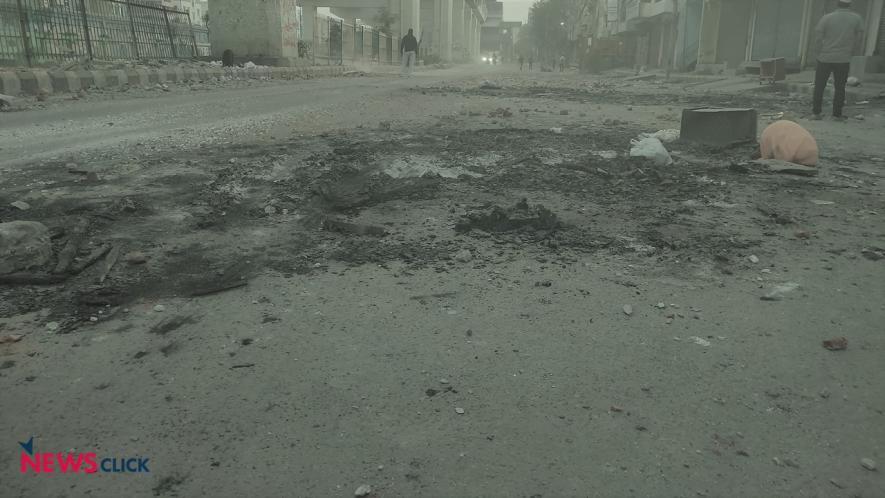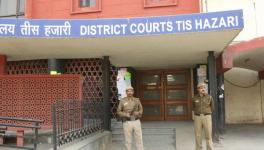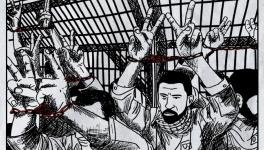Delhi Violence: Cops Given Extension Under UAPA to Complete Probe into Conspiracy Case

File Photo.
New Delhi: A district court in the national capital on August 13 gave an extension to the Special Cell of the Delhi Police to complete its investigation into the conspiracy case (FIR No. 59/2020) of the communal violence in North-East Delhi which took place in February this year.
The court also extended the detention period of the ten accused in the matter. They may not be able to get bail before September 17.
Tensions in the Trans-Yamuna region came to a boil in the evening of February 23, escalating to a full-blown riot which lasted for well beyond 48 hours. A total of 53 people were killed and over 500 suffered injuries in the violence.
The case names 20 people — most of them students and activists who were active in protests against the Citizenship (Amendment) Act (CAA) — who face stringent charges under the anti-terror law, Unlawful Activities (Prevention) Act, 1967 or UAPA, in addition to Indian Penal Code (IPC) sections like murder, attempt to murder, criminal conspiracy and sedition.
The police have arrested 19 accused so far. While 15 of them are in judicial custody, four are out on bail. Notably, the accused in the case were first arrested in connection with different cases. When they were either granted bail or were likely to be released by courts, they were re-arrested under the aforementioned FIR.
On August 10, Special Public Prosecutor Amit Prasad sought an extension of the period of investigation and detention of the ten accused till September 17, under Section 43 (D) of the UAPA. He submitted that the role of different organisations and groups involving the accused is still under investigation. He also contended that there was a lot of electronic data that needed to be examined, along with a money trail which supposedly establishes that the riots were funded.
Also Read: Delhi Violence: The Curious Case of Complaints Attached With a Single FIR
Section 43 (D) of the UAPA allows the investigating agency – the Special Cell of the Delhi Police in this case – to seek an extension to wrap up the probe. If the prosecuting agency fails to complete its probe within the stipulated 90 days and its inquiry remains inconclusive, it can seek an extension for another 90 days. For doing so, the agency has to seek permission from the court where it has to file the chargesheet. As a result, the detention period of the accused also gets extended.
Additional Sessions Judge Amitabh Rawat accepted the application filed by Prasad and recorded in his 14-page order: “After perusing the present application-cum-report of the special public prosecutor and the case diary and record, I am satisfied that the prosecution has been able to make out a case for extension of the period of investigation and detention of the accused.”
Those whose detention period has been extended include activist Khalid Saifi and former Congress councillor Ishrat Jahan, both of whom will complete 180 days in custody on September 17. The others are Meeran Haider, a research scholar at Jamia Millia Islamia who will complete 180 days in custody on September 29, suspended Aam Aadmi Party (AAP) leader Tahir Hussain, who will complete 180 days in custody on October 3.
Gulfishan Fatima, a college student from Seelampur, will complete 180 days in custody on October 8. Jamia Alumni Association President Shifa-Ur-Rahman’s detention for 180 days will be over on October 23. Jamia student Asif Iqbal Tanha’s detention for 180 days will be over on November 15/ Shadab Ahmad will complete the period on November 16 and Jawaharlal Nehru University (JNU) students Natasha Narwal and Devangana Kalita’s judicial custody will end on November 25 and December 2 respectively.
While Meeran, Tahir, Gulfisha and Shifa-Ur-Rehman will have spent almost five months in jail by September 17, Asif, Shadab, Natasha and Devangna will have completed a little over 90 days.
The police have sought an extension for the second time for six of the accused — Khalid, Jahan, Haider, Hussain, Gulfisha and Rehman — and for the first time for the remaining four.
Counsels for all the accused opposed the public prosecutor’s application, stating that they have not received copy of the application and that they may be provided the copy of the same so that they could oppose it and address arguments.
However, the court dismissed the defence lawyers’ opposition after referencing earlier Supreme Court and Delhi High Court judgments.
The Delhi High Court in Sharjeel Imam Vs. State of NCT of Delhi, 2020 had held that the accused does not have a right to oppose the application/report moved by the special public prosecutor. “Production of the accused at that time in the court informing him that the question of extention of the period of completing the investigation is being considered, is alone sufficient for the purpose,” the HC had held.
It implies that the appearance of the accused and their lawyers is not meant for them to object the extension, but only to inform them about the court’s decision about the extension.
Some lawyers challenged the extension on the grounds that the law allows for an extension only once, and not twice. However, the judge disagreed with this contention and opined that the UAPA permitted an extension of up to 180 days.
Making an observation on the special public prosecutor’s report-cum-application, the judge said: “The investigation is still going on regarding the conspiracy which is deep-rooted, large scale and multi-layered and all the different aspects pertaining to different accused person, including their inter-linkages are being investigated as regards the conspiracy. Since overall conspiracy is being unearthed and because of inter-linkages of accused persons whose custody is expiring on different dates, the request of seeking extension of period of investigation and detention until 17 September is made out,” the judge held.
The present case (FIR No. 59/2020) was registered at Crime Branch police station on March 6. The investigation was later transferred to the Special Cell of the city police. As of now, the case refers to Sections 13, 16, 17 and 18 of the UAPA, IPC sections of 120B read with 124-A, 302, 307, 353, 186, 212, 341, 395, 427, 435, 436, 452, 454, 420, 468, 471, 201, 109, 114, 147, 148, 149, 124A, 153A and 34, Sections 3 and 4 of the Prevention of Damage of Public Property Act and Sections 25 and 27 of the Arms Act.
Also Read: Delhi Violence: How ‘Kattar Hindu Ekta’ WhatsApp Group Mobilised Rioters for Killings
The case relates to an alleged conspiracy during the Delhi riots, which was stated to be “pre-planned” and took place during the visit of United States President Donald Trump to India on February 24. The investigators have alleged that “lot of conspiracy/preparations were made for the said riots in the guise of the CAA protest”.
The communal conflagration resulted in the deaths of 53 people and injuries to hundreds, in addition to loss of private and public properties. More than 750 FIRs have been lodged in connection with the violence.
Get the latest reports & analysis with people's perspective on Protests, movements & deep analytical videos, discussions of the current affairs in your Telegram app. Subscribe to NewsClick's Telegram channel & get Real-Time updates on stories, as they get published on our website.






















